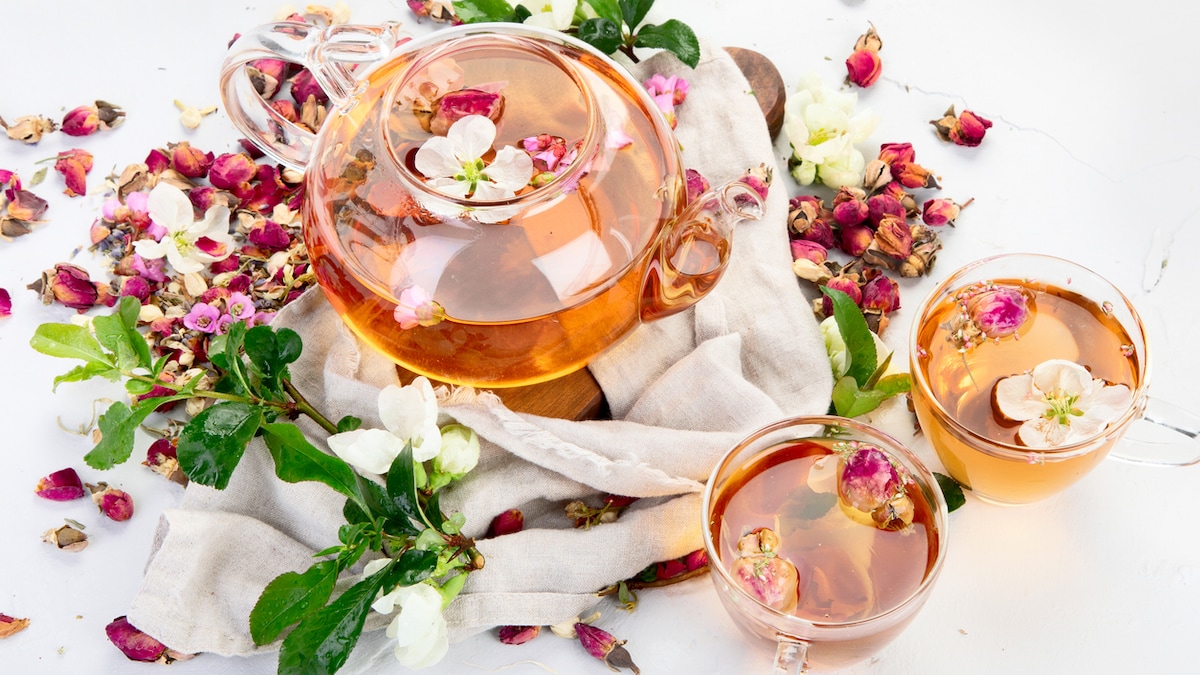1. Hibiscus Tea: A Heart-Healthy Antioxidant Boost
Hibiscus tea is rich in flavonoids, beta-carotene, and vitamin C, which help prevent the oxidation of bad cholesterol, promoting heart health. Dietitian Garima Goyal notes that hibiscus extract has been shown in studies to potentially lower systolic blood pressure. However, if you’re already on blood pressure medication, consult your healthcare provider before adding hibiscus tea to your diet for a safe and balanced approach.
2. Chamomile Tea: The Ultimate Relaxation Drink
Chamomile tea, made by steeping dried chamomile flowers, offers a gentle, calming aroma and a soothing effect. Wellness expert Anshul Jaybharat explains that chamomile tea is ideal for improving sleep quality. Unlike caffeinated teas, chamomile helps ease the mind, making it a perfect bedtime option. Its calming ritual can guide you into a relaxed state, encouraging restful sleep.
3. Blue Tea: A Collagen-Boosting Beauty Elixir
Blue tea, also known as butterfly pea flower tea, is a caffeine-free blend made from dried or fresh leaves of the Clitoria ternatea plant. This tea is packed with antioxidants, which nourish the skin, keeping it youthful and healthy. Blue tea also contains flavonoids that may stimulate collagen production, promoting a radiant complexion. Additionally, its catechins aid in weight management, making it a refreshing addition to wellness routines.
4. Rose Tea: An Anti-Inflammatory Powerhouse
Rose tea can be made by steeping dried rose petals in water or combining them with your preferred tea leaves. Known for its anti-inflammatory properties due to its antioxidant content, rose tea can aid digestion and reduce inflammation in the body. This floral tea’s mild and soothing taste pairs beautifully with a touch of honey, adding to its appeal as a relaxing beverage.
5. Lavender Tea: For a Calming, Mood-Lifting Experience
Lavender tea is brewed from the buds of the Lavandula angustifolia plant and is widely recognized for its mood-enhancing properties. Used often in aromatherapy, lavender’s soothing scent is complemented by its ability to promote better sleep and improve skin health. Studies on lavender extract reveal that it helps calm nerves, making it an excellent choice for unwinding after a long day.
6. Linden Tea: A Natural Remedy for Respiratory Health
Linden tea is made by steeping linden flowers for about 10-15 minutes. Sourced from the Tilia species, this tea is popular across North America, Europe, and Asia for its soothing effects on the nervous system. Research has shown that linden extract supports relaxation and helps relieve symptoms of fever, cold, cough, bronchitis, and asthma. The flavonoids and essential oils present in linden tea can also help ease digestive issues, including acid reflux and stomach discomfort.
Try These Floral Teas to Reap Health Benefits
Adding these delightful floral teas to your daily routine can not only enhance your wellness but also bring a touch of nature’s beauty to your tea time. From hibiscus to lavender, each cup offers unique benefits and a refreshing way to enjoy the health-boosting powers of flowers.


